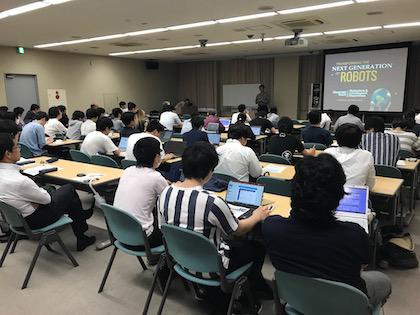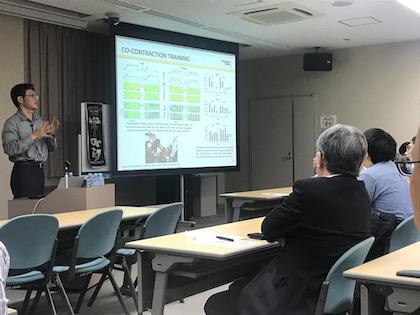KimiLab ワークショップ:サイバーフィジカルヒューマンシステムのセキュリティ最前線(Georgia Tech 上田淳先生,NII 岸田昌子先生,他)
ワークショップ:
サイバーフィジカルヒューマンシステムのセキュリティ最前線
Frontier of Secure Cyber-Physical-Human System
日時:7月16日(火)13:00〜17:20
場所:東3号館301室(学内マップ 東地区27)
主催:国立大学法人 電気通信大学 機械知能システム学専攻 小木曽研究室
支援:電気通信大学 研究活性化支援システム(研究インテグレーション促進支援)
制御システムに代表されるCyber-Physical System(CPS)や,CPSにヒト(Human)の要素が干渉するCyber-Physical-Human System(CPHS)では,モノの制御に加えて,情報系・物理系・ヒトとが相互かつ高度に融合することによる連携・協調・意思推定・プライバシー・セキュリティなどの学際的な課題を考える必要があります.特に,CPS・CPHSは,情報空間から物理系・ヒトに到達できるシステム構成であるため,システムや制御情報の秘匿化およびサイバー攻撃対策による安全・安心の強化は,極めて重要です.そこで,本ワークショップでは,CPSやCPHSの分野で世界的に活躍されている研究者をお招きして,セキュリティに関わる最先端の話題をご提供いただきます.そして,安全・安心を与えるサイバーフィジカルヒューマンシステムの構築に向けてセキュリティの重要性や課題を共有し,講演者との議論・交流を深める機会を提供いたします.また,制御工学や関連分野のテーマに興味のある本学学生や教員の皆さんの参加を歓迎いたします.最先端の研究成果が日本語で聴ける貴重な機会ですので,是非ご参加ください.[開催案内]
当日は,学内外から80名近くの方が参加され,とても活発な議論のかわされたワークショップとなりました.今後も引き続き制御システムのセキュリティに関して研究・交流を深めていきたいと思います.ご参加いただきどうもありがとうございました.
プログラム:
司会:鈴木仁美 URA
13:00-13:05 はじめに:中野 和司 国際・研究戦略担当理事
13:05-14:05 上田 淳 准教授(米国ジョージア工科大学)
14:05-14:40 小木曽 公尚 准教授(機械知能システム学専攻)
14:40-15:15 岸田 昌子 准教授(国立情報学研究所)
(休憩)
15:30-16:05 金子 修 教授(機械知能システム学専攻)
16:05-16:40 定本 知徳 助教(機械知能システム学専攻)
16:40-17:15 澤田 賢治 准教授(iPERC)
17:15-17:20 おわりに:小木曽 公尚 准教授
ワークショップの様子:
参加手続き・参加費:
参加手続きは不要,参加費は無料です.会場に直接お越しください.
講演概要:
13:05-14:05 上田 淳 准教授(米国ジョージア工科大学)
Title:
Precision Bio-Robotics for Safe, Secure and Stable Intervention
Abstract:
This talk will introduce the speaker’s recent research effort that aims to apply a systems engineering approach to the design and control of co-robots with high timing and spatial precision. Integration of such systems requires a new framework to achieve 1) high-precision motion control, 2) understanding of adaptation mechanisms and variability in the human sensorimotor system, and 3) adaptive control of physical human-robot interaction. A project supported by the National Science Foundation addresses neuromotor adaptation in robot-assisted manual assembly. A machine learning method was applied to achieve effective prediction of operator intent during tasks to proactively adjust contact impedance between the operator and robotic device for high positioning performance and stability. Another project studied temporal dynamics of cortical facilitation with afferent stimulation for the assessment of emerging stroke rehabilitation. A high-timing precision (< 2ms) robotic system that combined magnetic brain stimulation and peripheral mechanical stimulation was developed to investigate transient neuromodulation. Interstimulus interval was individually adjusted to compensate for individual differences in signal transduction times due to various anatomical physiological characteristics. Spatial resolution is the key characteristic in image-guided surgical intervention. A magnetic-resonance-imaging-compatible needle robot achieved precision required for testing the efficacy of direct stem cell injection to the spinal cord.
14:05-14:40 小木曽 公尚 准教授(機械知能システム学専攻)
Title:
Encrypted Control for Cybersecurity Enhancement
Abstract:
In this talk, I will present our pioneer work about enhancing the cybersecurity of networked control systems (cyber-physical systems) using cryptography. The primary purpose of this approach is to conceal feedback and control input signals as well as controller parameters. The idea is to employ a homomorphism of public key encryption schemes into the controller’s processing. This approach provides a new and significant property that the decryption process is not required to be inside the controller, which means the controller need not keep any private keys to calculate control inputs. Such a control system with built-in encryption is called an “encrypted control system.” The issue of how to encrypt the controller is called “controller encryption.”
14:40-15:15 岸田 昌子 准教授(国立情報学研究所)
Title:
Encrypted Control System with Quantizer
Abstract:
As communication networks and cloud services become to play essential roles for many control systems, it becomes desirable to develop security and privacy-preserving algorithms for these control systems. Motivated by this trend, this talk discusses encrypted control systems.
“Encrypted control system” is a control architecture in which the controller computes the control signal using encrypted sampled data without decrypting them. Because the controller does not require a private key for decryption, encrypted control systems can not only protect the privacy of the plant data from the controller, but also enhance the cyber-security by protecting the data in the controller from attackers. However, unlike many applications that use encryptions, encrypted control systems that run real-time require encryptions and decryptions repeatedly at every sampling time to compute control signals using newly acquired sampled data. Thus, it is not practical to use long keys for systems with limited computational resources. On the other hand, reducing the key length may lead to deterioration of control signals because of the size of plain-text space.
To overcome this issue, we proposed to construct a finite-level uniform quantizer whose sensitivity changes with the evolution of the system, design its associated control law, and then combine it with the Paillier cryptosystem.
15:30-16:05
金子 修 教授(機械知能システム学専攻)
Title:
データ駆動制御・推定・予測・認証 ―サイバーフィジカルヒューマンシステムへの一つのアプローチ―
Abstract:
制御しようとする対象の動特性を数式モデルで表すことなしに,データを直接用いて,制御器を設計する,または制御を行うアプローチとしてデータ駆動制御について,背景から最新の研究成果までを概説する.また,数式モデルがない状況で、対象のモデルと状態を同時に推定する手法,データから直接制御系の応答を予測する手法,制御器に対して安全な制御器であることを事前に認証を与える手法,について概説する.そして,これらの手法が,演者の考えるサイバーフィジカルヒューマンシステムでどのように活用され得るかという期待をお話しする.
16:05-16:40
定本 知徳 助教(機械知能システム学専攻)
Title:
セキュアな次世代電力システム実現に向けた、データ圧縮に基づく強化学習
Abstract:
本発表では,はじめに,セキュアな次世代電力システム実現に向けて必要になる制御機能及びセキュリティ機能について述べる.より安定な電力供給を実現するひとつのアプローチとして,強化学習に基づく広域制御器設計について述べる.一般に,強化学習に基づくアプローチは,対象が大規模になるほど爆発的に計算量が増加することが知られている.本発表では,可制御部分空間への射影に基づく新しいデータ圧縮を用いた計算効率の良い強化学習手法を概説する.さらに,最終的な制御性能と圧縮誤差とのトレードオフが存在することを理論的に示す.本手法を電力系統過渡解析で広く用いられるベンチマークモデルへと適用し,有効性を検証する.
16:40-17:15 澤田 賢治 准教授(iPERC)
Title:
協調型ホワイトリストによる多階層防御システムの実現
Abstract:
制御システムのサイバーセキュリティ対策として注目を浴びているのがホワイトリスト式セキュリ ティ機能である.ホワイトリストとは,正常な振る舞いをリスト登録し,リスト外の振る舞いを全 て異常として検知するセキュリティ機能の枠組である.ホワイトリストは正常な振る舞いが比較 的定まった制御システムに有効であるが,リストに登録された機能を悪用した攻撃に対しては 脆弱である.本講演では,制御システムのライフサイクルのモデル化によるリストの詳細化,多 階層検知による高精度化,協調動作による攻撃被害箇所の局所化を実現する協調型ホワイト リストの概要を説明する.






